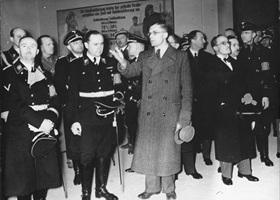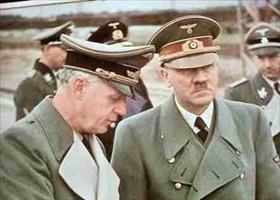BRITAIN, FRANCE FIRM ON POLAND
London, England and Paris, France · September 2, 1939
Shortly after British Prime Minister Neville Chamberlain and French Premier Édouard Daladier confirmed for themselves the German invasion of Poland on September 1, the two leaders gave the order for general mobilization and evacuation of children and mothers from their main cities. Both leaders also prepared to coordinate the delivery in Berlin of notes demanding German aggression against Poland be stopped and German troops promptly withdrawn. If the Germans could not provide assurance of that happening (there was no deadline), the British note concluded that the British government would fulfill its obligation under the terms of the Anglo-Polish military pact concluded the month before. The British and French notes were handed to Adolf Hitler’s foreign minister, Joachim von Ribbentrop, late on the 1st. Reading the notes Hitler could not determine if they were formal ultimatums or not. But on this date in 1939 Hitler had decided that if the notes were ultimatums, he would have nothing to do with the idea—hastily floated in several European capitals, but mainly in Rome—of holding a peace conference. (Hitler said as much to Benito Mussolini the next day, adding that no conference was possible that devalued the “blood sacrifice” already made by German soldiers.) Near 8 p.m. on September 2, Chamberlain found the British House of Commons in an anxious and truculent mood partly due to the absence of a deadline that might compel German forces to leave Poland. He sensed that his government would collapse the next day without an early deadline for German withdrawal. Daladier, on the other hand, speaking to the French Chamber of Deputies, received a standing ovation when he ticked off French efforts to save the peace and the necessity of honoring the West’s pledges to Poland. (Chamberlain could have shared with Members of Parliament similar examples of the West’s efforts and pledges of support, but his speech was ill-prepared, uninspiring, very short (four minutes), and late in a very long day; hence, the angry mood of some MPs.) Near midnight London and Paris finessed parallel ultimatums, to be delivered in Berlin at 9 a.m., September 3, to expire later that day. Germany was to withdraw its troops from Poland immediately or a state of war would exist between the three nations.
[amazon_carousel widget_type=”ASINList” width=”600″ height=”200″ title=”Recommended Reading” market_place=”US” shuffle_products=”False” show_border=”False” asin=”0199676097,1441185933,1402779992,0465013724,1848853777,1556524552,0143120069,0674284003,0986451495,0141441720″ /]
French Ambassador Delivers Ultimatum to German Foreign Minister
 |  |
Left: Robert Coulondre (1885–1959) was France’s dapper ambassador to Berlin, shown here with outstretched arm in 1939. (Reichsfuehrer-SS Heinrich Himmler is at left in photograph.) It was Coulondre who, on the morning of September 3, handed German Foreign Minister Joachim von Ribbentrop his government’s ultimatum, worked out the night before with London, demanding Germany “suspend all aggressive action against Poland and to declare themselves ready promptly to withdraw their forces from Polish territory” or face the consequences. France gave the Germans till 5 p.m. to comply. Ribbentrop said icily, “Very well, France will be the aggressor,” to which Coulondre coolly replied: “History will be the judge of that.”
![]()
Right: Berlin’s diplomatic community thought Ribbentrop a “bumptious” (Coulondre’s words) person. Coulondre and Sir Nevile Henderson, Britain’s ambassador to Berlin, remarked on Ribbentrop’s snubbing them in their dealings with the German Foreign Office. Both diplomats much preferred working with Ribbentrop’s deputy, State Secretary Baron Ernst von Weizsaecker, an ex-naval officer and the father of future German President Richard von Weizsaecker (in office 1984–1994).
Hitler’s Blitzkrieg Targets Poland, Then Western Europe the Next Year
![]()

 History buffs, there is good news! The Daily Chronicles of World War II is now available as an ebook for $4.99 on Amazon.com. Containing a year’s worth of dated entries from this website, the ebook brings the story of this tumultuous era to life in a compelling, authoritative, and succinct manner. Featuring inventive navigation aids, the ebook enables readers to instantly move forward or backward by month and date to different dated entries. Simple and elegant! Click
History buffs, there is good news! The Daily Chronicles of World War II is now available as an ebook for $4.99 on Amazon.com. Containing a year’s worth of dated entries from this website, the ebook brings the story of this tumultuous era to life in a compelling, authoritative, and succinct manner. Featuring inventive navigation aids, the ebook enables readers to instantly move forward or backward by month and date to different dated entries. Simple and elegant! Click 











